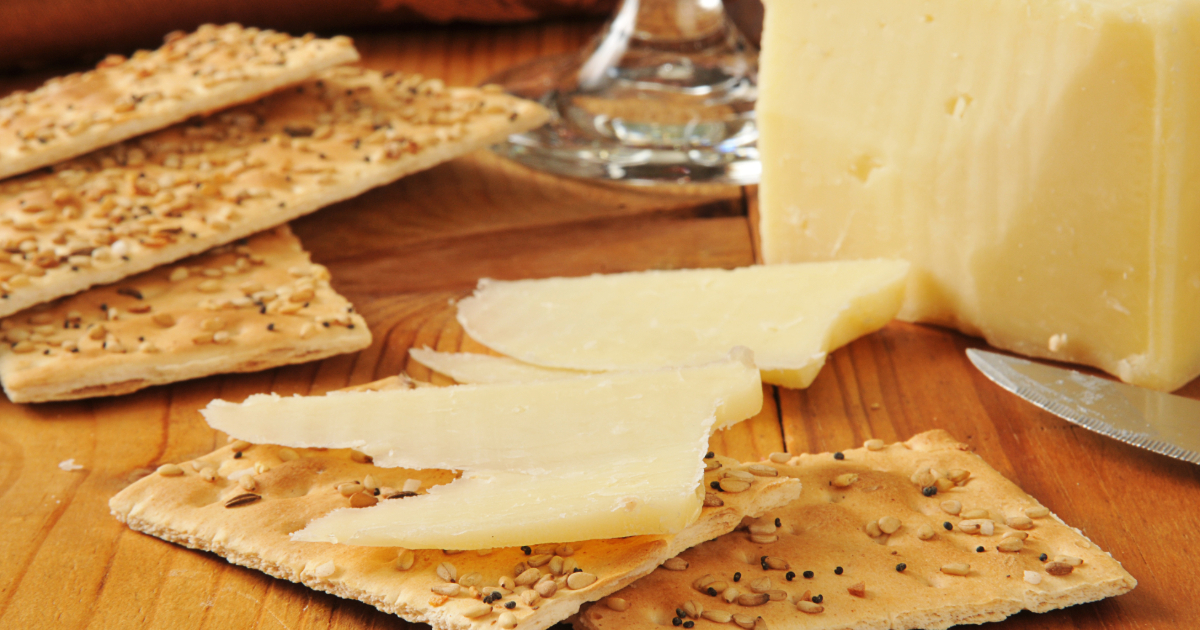Vermont is known for its delicious artisanal cheeses. With over 45 cheesemakers across the state, there is a huge variety of Vermont cheeses to enjoy. From creamy goat cheese to sharp, aged cheddar, Vermont offers cheese lovers something special.

Cheesemaking has a long history in Vermont. In the 1800s, there were hundreds of small dairy farms across the state, each producing their own butter and cheese. By the mid-1800s, Vermont cheese co-ops began forming. These were centrally located factories where farms would bring their milk to be made into butter and cheddar.
While this shift from farmstead to co-op production allowed for larger scale cheesemaking, it also signaled the decline of traditional practices. By the early 1900s, industrialization further changed cheesemaking in Vermont. Only a handful of producers like Crowley Cheese (est. 1824) and Cabot Creamery (est. 1893) survived this period.
In recent decades, there has been a revival of artisan cheesemaking in Vermont. Small dairy farms have returned to traditional practices, creating farmstead cheeses from their own milk. The new generation of cheesemakers produce not just cheddar, but a wide variety of cheeses like chevre, gouda, and blue cheese. Many also offer tours and tastings, creating an agritourism draw.
Reasons for the Resurgence of Artisan Cheese in Vermont
There are several factors that have led to the reemergence of small-scale cheesemaking in Vermont:
- Declining milk prices - Producing value-added products like cheese allows farms to get a higher return than just selling milk commodities.
- Increased interest in local food - There is growing consumer demand for artisanal foods made nearby. Cheese taps into the farm-to-table movement.
- Agritourism - Opening up farms for tours and tastings provides additional revenue. Cheesemaking becomes an attraction.
- Supporting small farms - Producing handcrafted cheese enables preserving family dairy farms and rural communities.
- Sense of tradition - After decades of industrial cheesemaking, there is nostalgia for returning to traditional practices.
Key Takeaway: Vermont has experienced a cheese renaissance due to factors like declining milk prices, agritourism demand, and a desire to preserve small family farms and traditional practices.
What Makes Vermont Cheese Special?
Vermont's landscape and climate are ideal for dairy farming. The green mountains and lush pastures provide rich forage for the cows, sheep, and goats that produce the high-quality milk that becomes Vermont cheese.
Beyond the milk, several elements come together to create the state's distinctive cheeses:
- Terroir - The geography and microclimate impart subtle flavors, like grass and herbs. Each season offers new flavors.
- Farmstead production - Many cheeses are made on the farms housing the animals. This milk travels the shortest distance, preserving freshness.
- Artisan techniques - Cheesemakers use time-honored practices like hand-crafting and natural rind development. This leads to complex flavors.
- Small batches - Compared to mass-produced cheeses, small quantities allow for focus on quality.
- Innovation - Alongside tradition, cheesemakers aren't afraid to experiment with new styles and flavors.
Key Takeaway: The high-quality milk, farmstead production, artisan techniques, small batches, terroir, and innovation come together to create Vermont's distinctive cheeses.
Major Types of Vermont Cheese
With over 150 varieties made in the state, there is incredible diversity in Vermont cheese. Some major types include:
Fresh Cheeses
- Chevre - Fresh, mild, and creamy goat's milk cheese. Often enhanced with herbs or other flavors.
- Fromage Blanc - Delicate, spreadable cows' milk cheese with a subtle tang.
Bloomy Rind Cheeses
- Camembert - Buttery round cheese with a soft, white rind. Made from cows' milk.
- Brie - Soft, creamy interior with a signature white rind. Made from cows' milk.
Washed Rind Cheeses
- Tarentaise - Semi-soft washed rind cheese inspired by French Epoisses. Rich, meaty flavor.
- Oma - Creamy, pungent washed rind cheese with a fruity tang. Made from raw cows' milk.
Blue Cheeses
- Bayley Hazen Blue - Moist, crumbly blue cheese with grassy and nutty notes. From raw cows' milk.
- Barnard Blue - Semi-soft blue cheese with a rich creaminess and bold blue veining.
Cheddars
- Cabot Clothbound Cheddar - Aged for 14 months to develop a complex nutty and caramelized flavor.
- Grafton Village Cheddar - Firm, smooth cheddar aged for at least two years, with sharpness balanced by nuttiness.
Alpine Cheeses
- Alpha Tolman - Hard, Alpine-style cheese with a subtly sweet, nutty flavor. Aged at least 12 months.
- Benton's Country Cavalier - Firm, fudgy cheese inspired by Swiss Appenzeller. Rich and complex flavor.
| Cheese Type | Description | Example Cheeses |
|---|---|---|
| Fresh | Soft, spreadable, mild | Chevre, Fromage Blanc |
| Bloomy Rind | Soft-ripened with white rind | Camembert, Brie |
| Washed Rind | Pungent, meaty flavor | Tarentaise, Oma |
| Blue | Blue veining, moist interior | Bayley Hazen Blue, Barnard Blue |
| Cheddar | Aged, complex flavor | Cabot Clothbound, Grafton Village |
| Alpine | Hard, nutty, sweet | Alpha Tolman, Country Cavalier |
Key Takeaway: Major Vermont cheese types include fresh cheeses, bloomy rind cheeses, washed rind cheeses, blues, cheddars, and Alpine-style cheeses.
Where to Buy Vermont Cheese
There are several excellent options for purchasing Vermont artisan cheese:
- Visit cheesemakers - Many farms have shops where you can buy cheese direct. This offers the full experience.
- Farmers markets - Markets across Vermont feature local cheesemakers selling their products. A great place to taste and compare.
- Specialty shops - Stores like Murray's Cheese focus on small-production Vermont cheese alongside other American and European offerings.
- Co-ops and cheese shops - Food co-ops and local cheese shops pride themselves on excellent selections of regional cheese.
- Online - Several cheesemakers sell online through their website. Larger online merchants like igourmet.com also offer nationwide shipping of Vermont cheeses.
When buying Vermont cheese, look for the Vermont Cheese Council logo to ensure purchasing an authentic regional cheese. This non-profit organization supports Vermont cheesemakers and promotes their products.
Key Takeaway: Purchasing options include buying direct from cheesemakers, farmers markets, specialty cheese shops, co-ops, and online mail order.
Serving and Pairing Vermont Cheese
Vermont cheese is exceptionally versatile. Here are some tips for serving and pairing:
- Feature Vermont cheddar, gouda, and Alpine cheeses in grilled cheese sandwiches. The melty textures pair perfectly.
- Fresh cheeses like chevre lend themselves to spreading on flatbreads, crackers, and bagels. Top with fresh herbs, honey, or jam.
- Set out a cheese plate with a selection of Vermont cheeses, nuts, chutney, and fruit. Offer a range of textures and milks.
- Pair washed rind cheeses with salty or sweet elements. Try prosciutto and fig preserves.
- Drizzle fresh berries or slices of ripe peach or pear with honey and top with creamy chevre.
- Include Vermont cheddar in mac and cheese or cheese souffle for a flavor boost.
- Crumble blue cheese like Bayley Hazen over a green salad with crunchy nuts and a tangy dressing.
Key Takeaway: Vermont cheeses pair well with fruits, nuts, chutney, prosciutto, grilled sandwiches, cheese plates, salads, and more.
Vermont Cheese Festivals and Events
Vermont celebrates its cheeses through various public events and festivals:
- Vermont Cheesemakers Festival - Held annually each July in Shelburne, this outdoor festival brings together cheesemakers offering samples alongside other local food and beverages. Cheesemaking demonstrations are also offered.
- Vermont Dairy Festival - Taking place each June at Billings Farm & Museum in Woodstock, this festival highlights all things dairy alongside cheese producers. Events include milking demos, cheese tastings, and cooking with dairy.
- Vermont Cheese Council Annual Meeting - Cheese industry professionals convene to discuss the latest in artisan cheese. However, the public event also offers cheese tastings and culinary demos open to all.
- Farm tours and open houses - Visiting dairy farms allows you to see cheese being made. Many farms hold annual open house days or arrange tours.
Key Takeaway: Vermont cheese festivals, farm tours, and other public events allow you to celebrate and taste Vermont cheeses alongside the cheesemakers.
Vermont Cheese Trail
The Vermont Cheese Trail maps out over 40 cheesemakers across the state that are open to visitors. Farms on the trail offer:
- Farmstead tours to see how cheeses are produced
- Cheese tastings and sales in farm shops
- Cafes or restaurants featuring their cheeses
- Lodging like bed & breakfasts on cheese farms
Some notable stops on the Vermont Cheese Trail include:
- Jasper Hill Farm - Tour the cellars aging Cabot Clothbound Cheddar and other cheeses. Stop in the farm shop.
- Consider Bardwell Farm - Watch the cheesemaking process from viewing windows and sample their raw milk cheeses.
- Vermont Creamery - Interactive tours and cheese tastings available daily at one of the state's most popular creameries.
- Blythedale Farm - Milking parlor viewing, cheese tastings, and picnic grounds at this family-run cheese farm.
Key Takeaway: The Vermont Cheese Trail offers an interactive way to meet cheesemakers and taste cheeses across the state through tours, tastings, lodging, and more.
Protecting the Vermont Cheese Tradition
Organizations like the Vermont Cheese Council work to preserve the state's artisan cheese heritage in several key ways:
- Promoting Vermont cheesemakers - Increasing awareness of Vermont cheese through marketing campaigns, education, and events.
- Supporting cheesemakers - Providing resources on best practices and navigating regulations to help cheese businesses thrive.
- Quality and sustainability standards - Ensuring Vermont cheese is high-quality and produced using responsible practices.
- Maintaining cheesemaking skills - Offering training programs and apprenticeships to pass on skills to new generations.
- Research and development - Conducting studies on new cheese recipes using local milk or improving methods.
- Advocating for policy - Working with state and federal agencies to create appropriate regulations for artisan producers.
The Vermont cheesemaking tradition remains vibrant thanks to passionate producers rooted in the land and committed to quality. As consumers, we can support the future of Vermont cheese by seeking out these regional cheeses and the stories behind them.
Key Takeaway: Groups work to sustain Vermont's cheese legacy through promoting cheesemakers, training programs, research, quality standards, and policy advocacy.
FAQs
What makes Vermont cheese different from other cheeses?
The terroir and landscape of Vermont impacts the unique flavor of cheeses here. Small-scale production using artisan techniques also sets Vermont cheeses apart. The cheeses reflect regional traditions.
What are some award-winning Vermont cheeses?
Many Vermont cheeses win national and international awards. Some award-winning ones include Cabot Clothbound Cheddar, Alpha Tolman Alpine cheese, Bonne Bouche from Vermont Creamery, and Harbison from Jasper Hill.
Are all Vermont cheeses made from cows' milk?
While cows' milk is common, Vermont also has excellent goat and sheep's milk cheeses like chevre from Fat Toad Farm or Ouleout from Parish Hill Creamery. Mixed milk cheeses join the lineup too.
Can you visit Vermont cheesemakers?
Yes, visiting cheese farms provides an immersive experience. Many offer tours, tastings, shops, lodging, and dining onsite. The Vermont Cheese Trail maps out cheesemakers you can visit.
Where can I buy Vermont cheese if I don't live there?
Online cheese stores ship nationwide, so you can order Vermont cheese direct. Whole Foods, Murray's Cheese Shops, and specialty grocers also carry some Vermont cheeses beyond the state's borders.
Conclusion
Vermont's small-scale cheesemakers carry on generations of tradition using high-quality local milk and artisan techniques.
The state's lush landscape and dedication to quality cheese make it an exceptional region for cheese lovers to visit and enjoy both onsite and from afar.
By supporting the growth of Vermont cheeses, consumers play an important role in sustaining the future of these family farms and cheesemaking heritage.

